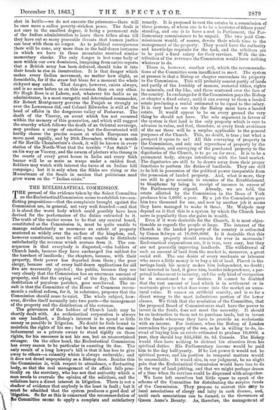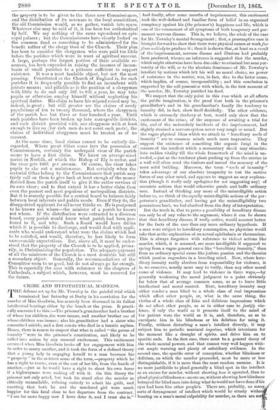THE ECCLESIASTICAL COMMISSION. THE perusal of the evidence taken by
the Select Committee 1 on the EcelesiastioalCommission seems to establish two con- flicting propositions—that the complaints brought against the Commission are, in general, not very well founded—and that it is about the worst body which could possibly have been devised for the performance of the duties entrusted to it. The truth of the matter seems to be that any central board, constituted as the Commission is, must be quite unable to manage satisfactorily so enormous an extent of property scattered so widely over the surface of the kingdom, and, however constituted, must be still more unable to distribute satisfactorily the revenue which accrues from it. The con- sequence is that everybody is disgusted,—the holders of Church lands, be,canse they have exchanged the mildest for the harshest of landlords ; the chapters, because, with their property, their power has departed from them ; the poor clergy, because out of every half-dozen applications for aid five are necessarily rejected ; the public, because they see very clearly that the Commission has an enormous amount of property, and that the cryin.p evil of the day, the spiritual destitution of populous parishes, goes unrelieved. The re- sult is that the Committee of the House of Commons recom- mends a radical reform, for it, in substance, proposes that the Commission should cease to exist. The whole subject, how- ever, divides itself naturally into two parts—the management of the property and the distribution of the revenue.
The grievances of the holders of Church lands may be shortly dealt with. An ecclesiastical corporation is always an easy landlord, a Bishop's interest is to spend as little money as possible in litigation. No doubt he feels bound to maintain the rights of his see ; but he has not even the same inducement as a private owner to stand rigidly on those rights, for his successor is not his son, but an nnascertained stranger. On the other hand, the Ecclesiastical Commission has every reason to be particular in exacting its due. The only result of a long lawyer's bill is that it has less to give away to others—a calamity which is always endurable; and it does not dread unpopularity as a Bishop does. Besides this the Commission is, with respect to attendance, a fluctuating body, so that the real management of its affairs falls prac- tically on the secretary, who has not that authority which a man needs to overrule the opinion of the solicitors, and the solicitors have a direct interest in litigation. There is not a shadow of evidence that anybody is the least in fault ; but it must be admitted that the system produces a good deal of Vtigation, So far as this is concerned the recommendation of fhe Committee seems to apply a complete and satisfactory remedy. It is proposed to vest the estates in a commission of three persons, of whom one is to be a barrister of fifteen years' standing, and one is to have a seat in Parliament, the Par- liamentary commissioner to be unpaid. The two paid Com- missioners would, of course, devote their whole time to the management of the property. They would have the authority and knowledge requisite for the task, and the solicitors are to be paid a fixed salary for their services. With the dis- tribution of the revenues the Commission would have nothing whatever to do.
There is, however, another evil, which the recommenda- tions of the-Committee seem insufficient to meet. The system at present is that a Bishop or chapter surrenders its property to the Commission. This will probably consist partly of lands and partly of the lordship of manors, rectorial tithes, rights to minerals, and the like, and these scattered over the face of the country. In exchange for it the Commission pays the Bishop or chapter a fixed salary, until it can convey to them a landed estate producing a rental estimated to be equal to the salary. It is very hard to see why the Bishop must have a landed estate. It would appear to be on every ground the very thing he should not have. The sole argument in favour of the system is that land is the only property which is sure to advance in value, and that, therefore, at every fresh avoidance of the see there will be a surplus applicable to the general purposes of the Church. This, no doubt, is true ; but what a prospect it opens to us All this conveying of property to the Commission, and sale and repurchase of property by the Commission, and conveying of the purchased property to the dignitaries of the Church, is to go on for over. It is to be a permanent body, always interfering with the land market. The dignitaries are still to be drawn away from their proper functions to perform the duties of landlords. They are still to be left in possession of the political power inseparable from the possession of landed property. And, what is more, they are still to give occasion to enemies of the Establishment to blaspheme by being in receipt of incomes in excess of the Parliamentary stipend. Already, we are told, the estate allotted by the Commission to the Dean of York produces him 3,000/. a year. By a job the Commission gave him two thousand for one, and now by another job it seems they have managed to make it three. Mr. Walpole may depend on it that this is a system by which the Church loses more in popularity than she gains in wealth.
Even if it were desirable for the Church, it is most objec- tionable as regards the people at large. The interest of the Church in the landed property of the country is estimated by Canon Selwyn at 18,000,000/. Is it desirable that this enormous property should remain for ever in mortmain? Ecclesiastical corporations are, it is true, very easy, but they are not generally improving landlords. The withdrawal of such an amount of land from the market is, moreover, a great social evil. The one desire of every mechanic or labourer who saves a little money is to buy a bit of laud. Placed in the savings-bank his money makes him independent, no doubt; but invested in land, it gives him, besides independence, a per- petual inducement to industry, and the only kind of occupation he is accustomed to or desires. It cannot be doubted that the vast amount of land which is in settlement or in mortmain gives to what does come into the market an unna- tural value. It causes an artificial scarcity, and is so far a direct wrong to the most industrious portion of the lower classes. We think that the resolution of the Committee, that the proposed Board of Commissioners shall have the power to invest in the funds, does not meet the necessity. It should be an instruction to them not to purchase lands, but to invest in the funds whenever they have to provide an ecclesiastic with an income. For instance, when the Bishop of London surrenders the property of the see, as he is willing to do, in- stead of buying him an estate estimated to produce 10,000/. a year, they should buy 333,333/. 6s. 8d. Consols. The Bishop would then have nothing to distract his attention from his spiritual duties. His Parliamentary income would be paid him to the day half-yearly. If he lost power it would not be spiritual power, and his position in temporal matters would be unassailable. It would also, in our judgment, be no slight gain that the Ecclesiastical Commission would have less to do in the way of land-jobbing, and that we might perhaps dream of a time when its services could be dispensed with altogether. We have left ourselves bat little space to speak of the scheme of the Committee for distributing the surplus funds of the Commission. They propose to entrust this *Sty to local associations of clergy and laity in each diocese, and, until such associations can be formed, to the Governors of Queen Anne's Bounty. As, therefore, the management of the property is to be given to the three new Commissioners, and the distribution of its revenues to the local associations, the old Commission would, as we gather, vanish into space.
Whatever else may be said of it, it has been too ecclesiastical by half. We say nothing of the sums squandered on epis- copal palaces ; but the Commissioners have clearly looked on the common fund as something to be administered for the benefit rather of the clergy than of the Church. Their plan has been to consider the clergymen who were paid too little before the parishes which were in want of spiritual succour. A large perhaps the largest portion of their available re-
sources, large, been expended in raising the incomes of incum- bents of small parishes to a pittance sufficient to support existence. It was a most laudable object, but not the most pressing. Constituted as the Church of England is, for such parishes it is frequently possible to find an incumbent with private means ; and pitiable as is the position of a clergyman -with little to do and only 50/. to 80/. a year, he may take pupils or otherwise employ himself without neglecting his spiritual duties. His claim to have his stipend raised may be, indeed, is great ; but still greater are the claims of needy populations of ten to twenty thousand, where the clergyman of the parish has but three or four hundred a year. Until such parishes have been broken up into manageable districts, and each district provided with one clergyman with at least enough to live on (for rich men do not covet such posts), the claims of individual clergymen must be treated as of no account.
At the same time, local claims cannot to be entirely dis- regarded. Where great tithes come into the possession of Commissioners, certainly the underpaid vicar of the parish seems to have a first claim. We know an average-sized parish in Norfolk, of which the Bishop of Ely is rector, and the vicar gets 100/. per annum. Of course, the vicar takes pupils to eke out a maintenance. But certainly when the rectorial tithes belong to the Commissioners that parish may fairly call on them to give back at least enough of the money derived from the parish itself to give it the entire services of its own vicar ; and to that extent it has a better claim than even the poorest and most populous of metropolitan districts. But it is scarcely possible for a central board to balance fairly between local interests and public needs. Even if they do, the disappointed applicant for aid never thinks so. He is postponed to he knows not whom—the minister of a parish he knows not where. If the distribution were entrusted to a diocesan board, every parish would know what parish had been pre- ferred to it, and why. Such a Board would have duties which it is possible to discharge, and would deal with appli- cants who would understand what were the claims which had to be satisfied, and would, therefore, be less likely to form unreasonable expectations. But, above all, it must be under- stood that the property of the Church is to be applied, prima- rily, in Christianizing the population. The adequate payment of all the ministers of the Church is a most desirable but still a secondary object. Generally, the recommendations of the Committee seem to us good, but do not always go far enough. This is especially the case with reference to the chapters of Cathedrals, a subject which, however, must be reserved for the future.



































 Previous page
Previous page